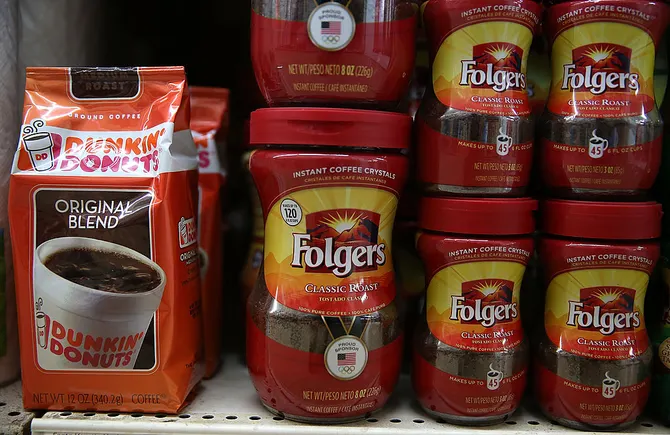Listen to the article
This audio is auto-generated. Please let us know if you have feedback.
Dive Brief:
- J.M. Smucker Co. plans to hike coffee prices for the fourth time since June 2024 as tariffs raise the cost of coffee bean imports, according to a June 10 earnings call.
- Coffee bean sourcing is the primary driver of direct material costs related to tariffs for Smucker, per the earnings call. The company primarily procures its unroasted coffee beans from Brazil and Vietnam, alongside other countries, as it is “an unavailable natural resource” domestically, CFO Tucker Marshall said on an earnings Q&A.
- “The current U.S. tariff impact on green coffee is our largest exposure that we will manage on top of navigating record-high costs for the commodity,” CEO Mark Smucker told investors.
Dive Insight:
Smucker buys about 500 million pounds of green coffee annually, making it the company’s largest tariff-impacted import, according to the earnings call. Outside of coffee, most of the company’s U.S. production is sourced domestically.
In August, the company plans to hike coffee prices for the fourth time since June 2024, per the earnings call. Smucker did not discuss pricing for specific brands, but the company’s most widely distributed coffees include Folgers, Dunkin’ and Café Bustelo, according to the company’s website.
Smucker’s areas of tariff exposure also include exports to countries with retaliatory tariffs, foreign-made products shipped to the U.S. and capital items made outside the country and used in its U.S. manufacturing plants, Marshall said.
“This has been factored into our outlook, and we are working to mitigate these cost increases through a combination of alternative sourcing strategies, supply chain optimization, and responsible pricing,” Smucker added.
Retaliatory tariffs from Canada, where Smucker sells peanut butter, ice cream toppings and coffee, contribute to higher costs, along with products co-manufactured outside the U.S., such as liquid coffee and wet cat food, Marshall said.
Also, capital goods bought for manufacturing plants carry tariffs, since they largely come from the European Union, the CFO said.
“The higher costs have required price increases across our business, and we anticipate the price elasticity of demand could remain elevated into 2026 as consumers continue to experience broader inflationary pressures and are selective in their spending,” the company said in a securities filing.
Companies in the food and beverage industry have struggled with pricing due to the uncertainty of tariff-related negotiations between the U.S. and its trading partners. The Campbell’s Co., for example, is considering “surgical pricing actions” while working with suppliers to dampen the impact of tariffs. Others, such as General Mills, Tyson Foods and Coca-Cola, have warned of potential impact on their bottom line.
This story was first published in our Procurement Weekly newsletter. Sign up here.


